Fragale & Sons Paving Shows Proper Prep and Best Practices Make Perfect
BY AsphaltPro Staff
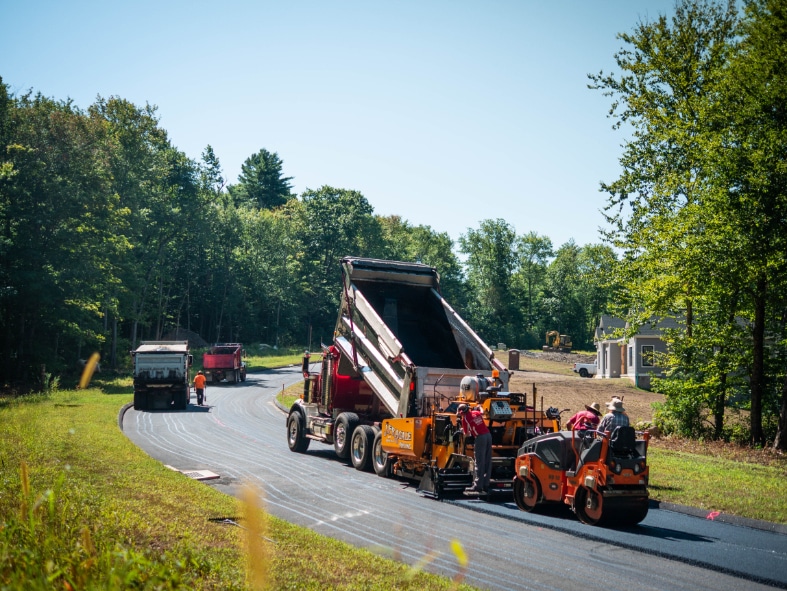
Fragale & Sons Paving Inc., illustrates that proper preparation and following best practices is a recipe for four generations of success.
When Joseph Fragale Senior emigrated from Italy to the United States in the 1920s, he arrived “with nothing but a strong back and a work ethic,” said Jake Fragale, the fourth generation behind J. Fragale & Sons Paving Inc., Torrington, Connecticut.
By the 1940s, Fragale Senior started paving driveways part time while working at the Brass Mills in Torrington, Connecticut. “A lot of driveways and roads were still gravel when my great-grandfather started the business,” Fragale said. As asphalt driveways became increasingly popular, Fragale Senior was able to grow the business until it was successful enough for him to quit the mill.
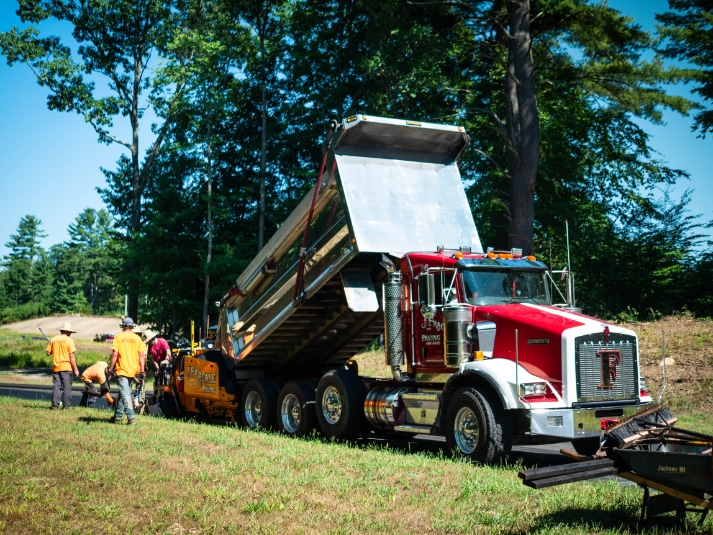
Fragale said another aspect of ensuring a smooth ride on the Harwinton project was maintaining a consistent paving speed and minimizing manual adjustments.
Soon, his son, Joseph Fragale Junior, joined the family business, followed by Fragale Junior’s son, Daniel Fragale, and later, Daniel’s son, Jake Fragale. “We are proud to continue providing quality, honest service for our community all these years later,” Fragale said.
He started working in the family business when he was 10 years old. “I started off pushing brooms, shoveling, tacking,” Fragale said. “My father wanted me to know where our family came from, so I started working full time on summer vacation until I graduated high school and joined full time.”
Around 75% of J. Fragale & Sons’ work is residential, while 20% is commercial and 5% is municipal. “The breakdown varies year to year,” Fragale said, adding that commercial work made up more of the company’s business in 2022 than previous years as a result of increased development in their area of operation. But, historically, the company’s bread and butter has been residential.
“Litchfield County has shopping centers and such, but it’s still a rural area,” Fragale said. In addition to full-time residents, the county is home to a sizable number of weekend homes belonging to New Yorkers looking to escape the city, he added. Together, that results in a healthy flow of residential paving work for J. Fragale & Sons—the niche for which the company is most well-known.
“We’ve been doing residential work for generations and we’re set up to do it very well,” Fragale said. “The demand for driveways in our area has been very high. We already had three months of work lined up for the spring by the end of 2022.”
Although J. Fragale & Sons always makes a point to make itself available to the prime contractors it works with regularly, Fragale said it’s not uncommon for the company to book out driveway work so far in advance that it cannot take on other commitments. “We always tell our customers up front what to expect,” Fragale said, “but anyone in the paving business knows the difficulty of keeping a schedule around the weather.”
The company also makes a point to get to the bottom of underlying problems causing pavement failures for its customers and recommend potential resolutions. “If your asphalt is failing, there is usually a reason for it.”
It’s that attitude that has underpinned the company’s decades of success. “We’ve built a good reputation in our area over four generations,” Fragale said. “And it didn’t happen from doing bad work.”
Best Practices Make Perfect
An important early step to quality paving is quality preparation, Fragale said. “You could be the best paver in the world, but if you pave over garbage, it’s not going to last,” he said, stressing the importance of performing base work properly, addressing water problems, and perfecting the grade. Even when J. Fragale & Sons are the subcontractor on a job and are only responsible for final grading, the company is sure to apply this attention to detail.
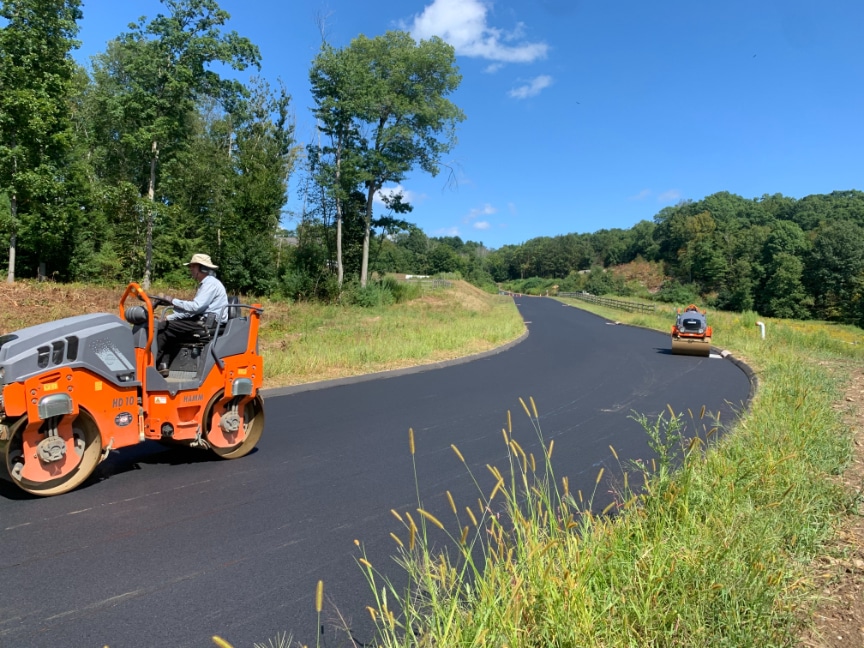
The roller operators were sure to compact the transverse joints at an angle to maximize smoothness with the crew’s Hamm HD-12 for breakdown rolling and Hamm HD-10 for finish rolling.
“I like to think of paving as laminating your grade,” Fragale said. “That’s how it was taught to me as a kid, and that’s how I’ll always think about it. I’ve seen firsthand that when we prep properly, paving goes smoothly. Good prep work is how we make asphalt last.”
Proper preparation is just one best practice Fragale has inherited. For example, “When I was a kid, my dad would tell me to check the mat with a level because the level doesn’t lie,” Fragale said. “My dad or grandfather would pass down this or that best practice and I used to think, ‘You don’t know what you’re talking about.’ But, I’ve come to realize they were right.”
Now, to impart these best practices to the entire crew, Fragale often prints out copies of John Ball’s training articles in AsphaltPro Magazine. “I’ll hand them around, like ‘See, we didn’t just make this up!’” he joked. “It helps me show them why these best practices are so important.”
A recent road J. Fragale & Sons completed for a new development in Harwinton, Connecticut, illustrates the importance of the company’s intergenerational wisdom. The road is just over a mile long with a cul-de-sac at the end, built for an area developer and longtime J. Fragale customer turning the large tract of land into lots for high quality homes.
“What made that project unique from paving a normal road job is that we were able to shut down the road completely,” Fragale said, “so we were able to pave the road with no cold seams.”
“That’s something that has always been drilled into my head, by my dad, by our foreman, is to have the smallest cold joint possible,” Fragale said, “and to have the smallest cold joint possible means to avoid cold long joints and end horizontally.”
“I realize that isn’t always possible on road jobs, and there are new standards for longitudinal joints emerging, but we strive not to leave any cold longitudinal joints for the next day whenever possible,” he said.
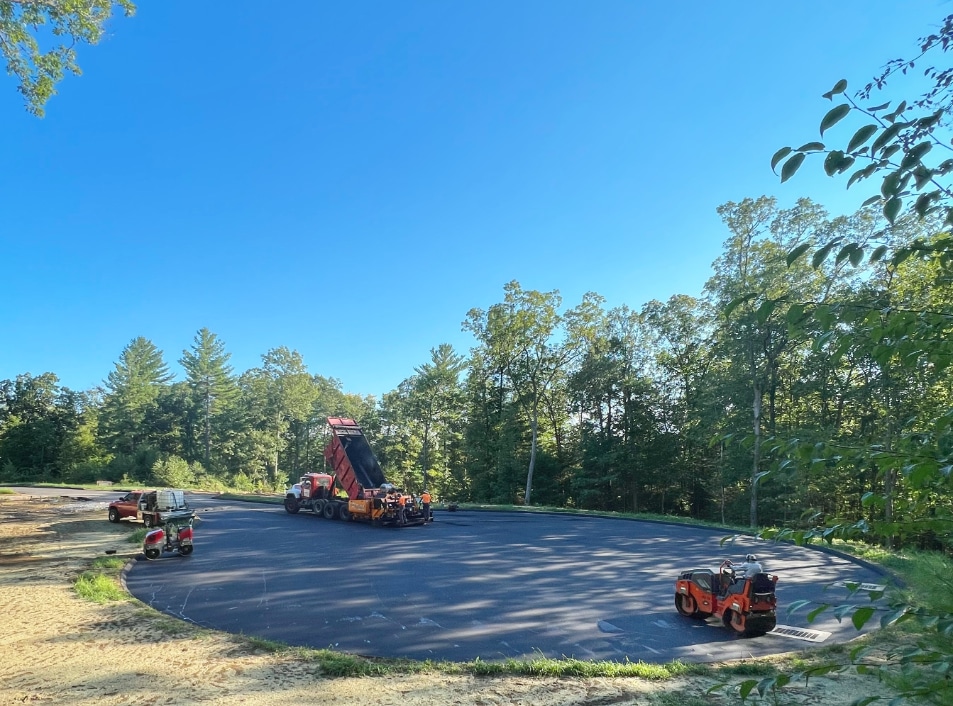
J. Fragale & Sons recently completed a road for a new development in Harwinton, Connecticut, for an area developer and longtime J. Fragale customer.
To minimize cold long joints on the new road in Harwinton, J. Fragale & Sons paved the 26-foot-wide road in two 13-foot-wide, back-to-back passes with its Leeboy 8520 paver with HD screed. “We’d pave around 500 feet then go back and mate into the previous pass we laid on the other half of the road,” Fragale said, adding that each 500-foot pass took 10 to 15 minutes, “so there was no cold long joint on the job.”
With 85-degree weather and such quick passes, even the transverse joints the crew left behind as it swapped sides were still hot by the time the crew returned to them to pave the next section. “At the end of the day transverse joints were minimized as much as possible, stopping close to the opposite lane,” Fragale said. “The small sections left still open were heated with a StreetHeat torch just before paving the following day.”
The crew also checks those transitions well with a straight edge to ensure a smooth ride. “Our crew is very good about quality control,” Fragale said. “We’re very fortunate to have a great crew.”
Fragale said another aspect of ensuring a smooth ride was maintaining a consistent paving speed and minimizing manual adjustments. “I was running the screw on that job and I think I might have done two adjustments throughout the entire day,” Fragale said.
The crew also employed a tip John Ball teaches—one that the company has been doing that for years—placing a piece of plywood over catch basins and the like so they could pave without stopping. “My screed was hot all day and the paver ran the same speed all day. We did everything in our power to make every transition as smooth as possible.”
In total, the job required more than 3100 tons of asphalt: a 2-inch binder course of CT spec Class 1 and a 1.5-inch top lift with CT spec Class 2. The mix was supplied by O&G Industries Torrington asphalt plant. “We’ve been doing business with O&G for years now and they’ve always been super helpful to us,” Fragale said.
In addition to best practices passed down from previous generations, Fragale also has an eye to his own legacy within the company, which includes the introduction of new processes, technology and the next generation of employees.
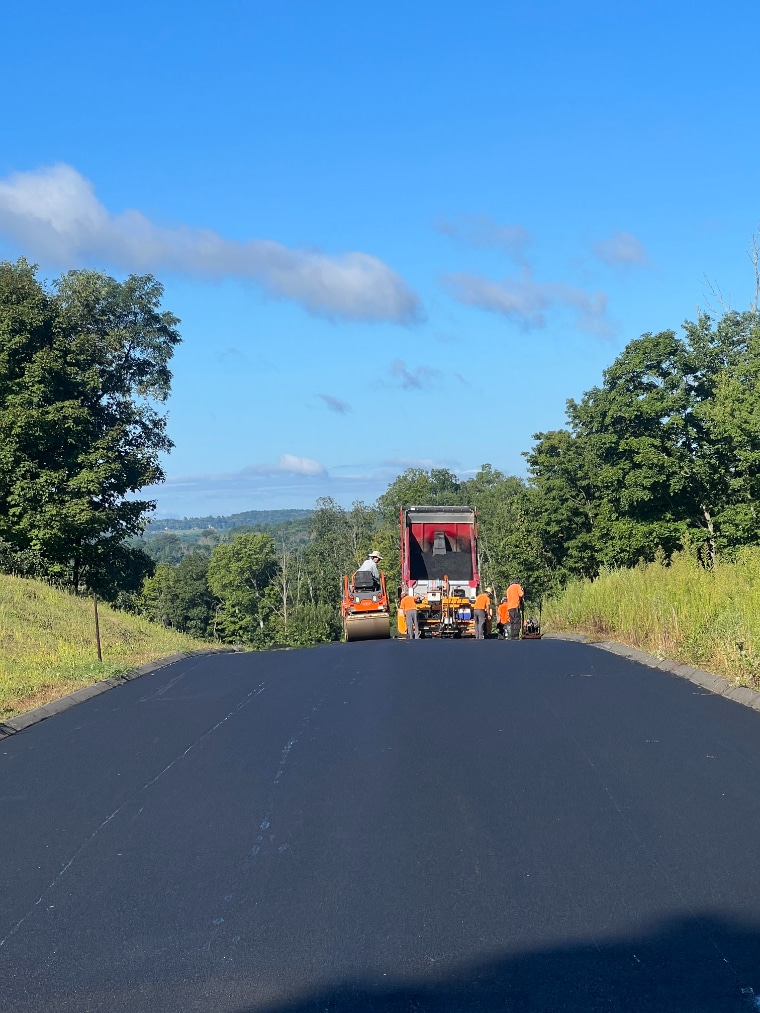
Proper preparation is just one best practice Fragale has inherited. “Good prep work is how we make asphalt last,” he said. “I like to think of paving as laminating your grade.”
For example, after reading “Measure Yield to Maximize Milling Benefits” in AsphaltPro, Fragale began using the Measure Map app recommended by Intercounty Paving Co’s Tyler Spano. “My father has always paid so much attention to tracking yield, but I never understood how important it is until I started running the paver myself,” Fragale said. “Just because the mix weighs the same, doesn’t mean it lays the same.”
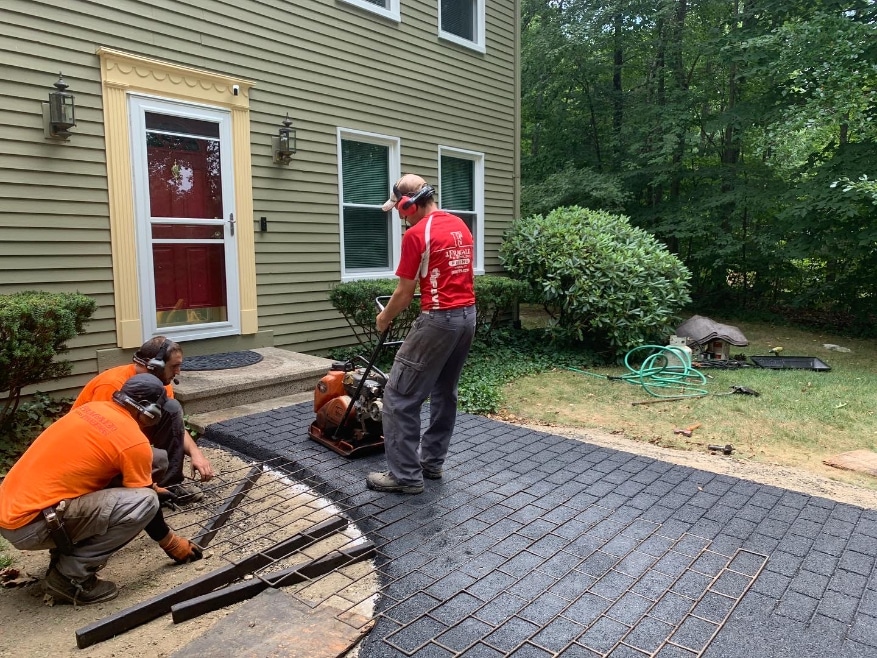
J. Fragale & Sons takes pride in its quality and attention to detail. “We’re not the kind of company that just comes in to paint it black and doesn’t look back,” Fragale said.
The introduction of the Measure Map app made following that existing best practice easier, Fragale said. “I used that app on our Harwinton job and our yield was right on the money every time,” he said. Although they wheeled off and marked 100-foot stations, the app was right on, Fragale added.
The company has also invested in its first GPS machine, a Caterpillar 315 excavator. And, Fragale is in the process of implementing a paperless estimating process. He’s also been involved in attracting the next generation of the company’s workforce.
“A lot of companies are having a hard time finding employees, but that hasn’t been the case for us,” Fragale said. Part of it, he added, is Fragale’s own age. “I’m younger, too,” he said, “and both my friends and friends of friends have come to work for us.”
Fragale also credits the company’s Instagram account. “I’ve hired two guys directly from Instagram that have been with the company for years now,” Fragale said. “Even hires that don’t come directly from Instagram often look at our page to see what we’re about.”
For example, a friend of a friend found J. Fragale & Sons’ Instagram and thought he could see himself on a paving train and came to work for the company. “This is where younger people are putting their time and finding out about new things,” Fragale said. “And that’s how we got their attention.”
Although Fragale said an Instagram account might not have much impact on sales, he thinks it’s a powerful and underutilized tool in terms of hiring. “We’re just documenting what we do, so potential employees will already have an idea of what we’re all about.”
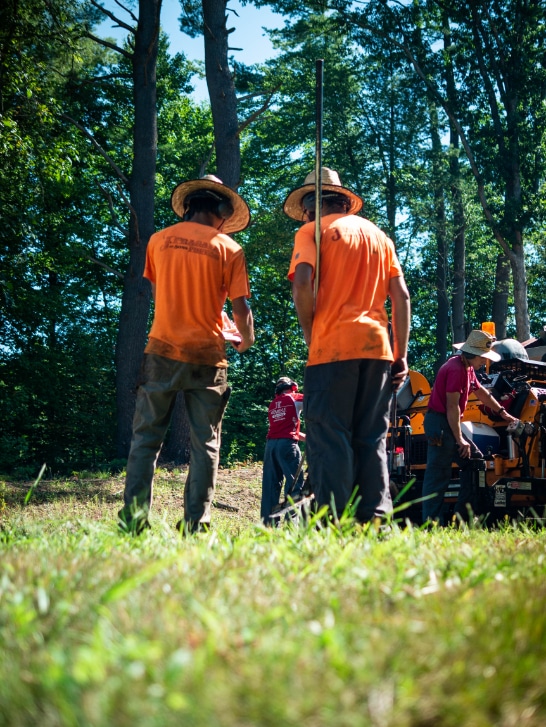
When it comes to retaining good employees, Fragale follows the family way. “There’s no mentality of ‘That’s his job’ on our crew,” Fragale said. “If someone needs a helping hand, my father or myself are going to be the first ones to go over there and do it.”
When it comes to retaining good employees, Fragale follows the family way. “There’s no mentality of ‘That’s his job’ on our crew,” Fragale said. “If someone needs a helping hand, my father or myself are going to be the first ones to go over there and do it. No one’s above any job.”
Nearly 80 years since Joseph Fragale Senior set the precedent, J. Fragale & Sons continues to show what can be done with a strong back and a good work ethic.
Jake Fragale’s Grading Principles
Properly preparing before paving has been an important lesson passed down to Jake Fragale. “Good prep work is how we make asphalt last,” Fragale said. Hitting the grade is an integral aspect of preparing to pave. “I like to think of paving as laminating your grade.”
To spread this lesson throughout J. Fragale & Sons, Fragale has laid out a series of grading principles. Here is an abbreviated version of his guidelines.
Know where the grade is.
“Everything in grading can be boiled down to cuts and fills,” he said. “You can’t identify cuts and fills until you know where the desired grade is.”
Look at cuts and fills.
“Now that you know where the grade needs to be, you can identify what needs to be done,” Fragale said. For example, does material need to be removed to install a suitable base? Can fill be utilized on site to avoid trucking costs? Where are there low areas that require more material? “Before a bucket or blade hits the ground these questions need answers.”
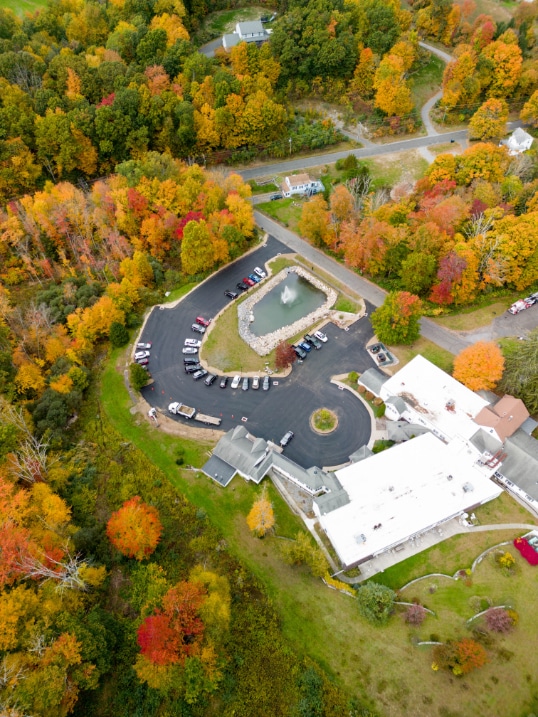
Around 75% of J. Fragale & Sons’ work is residential, while 20% is commercial and 5% is municipal.
You can’t grade air.
“Compaction is key,” he said. “Grade met that is not compacted is worthless.” Fragale instructs that, when fine grading a filled area, be sure to compact first. Sometimes, he adds, a rough grade is necessary before compacting.
“Get the material close to grade. Compact. Grade,” he said. “Do this so you can ‘cut to grade.’ Make this cut, then check. Small adjustments may have to be made. Make them.”
Check your work.
“Did you hit your marks? Is grade constant? Are your transitions smooth? Is the grade compacted?” Fragale asks. “Answer yes to these questions.”
